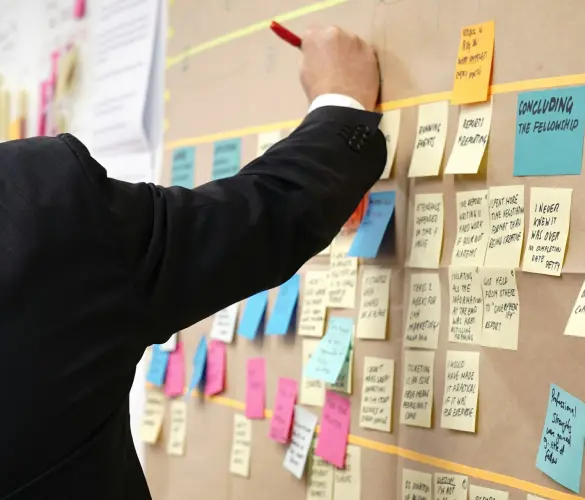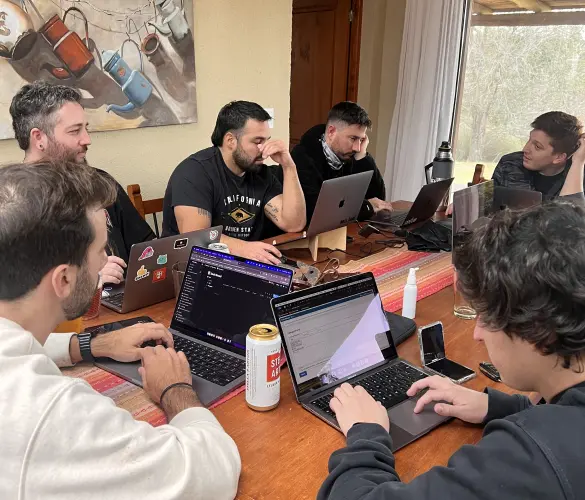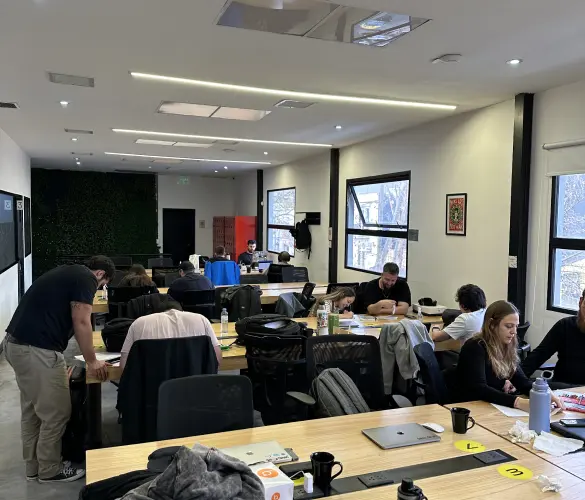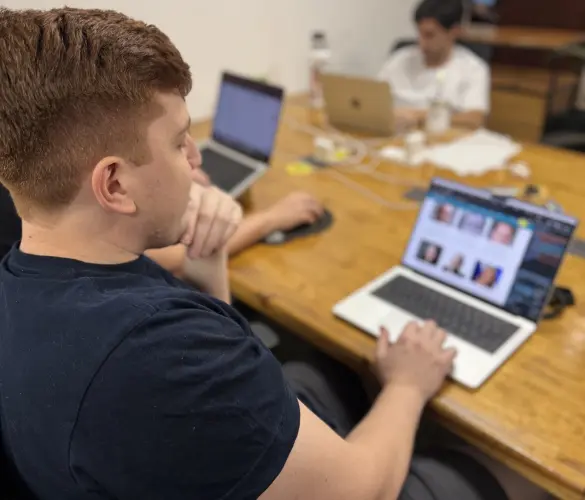- Blogs
- Behind the Canvas
- Managing Hours in WordPress Maintenance Projects: Transparency and Communication with Leerink Partners
Behind the Canvas / 5 min read
Managing Hours in WordPress Maintenance Projects: Transparency and Communication with Leerink Partners

Managing hours in WordPress maintenance projects can become challenging, especially when dealing with tasks that involve preliminary research or troubleshooting.
This post draws on our experience working with Leerink Partners, one of the most important healthcare investment banks, to highlight the importance of transparent communication and proactive hour management when providing maintenance to WordPress sites.
By obtaining upfront approval for hours dedicated to research and establishing clear client expectations, we were able to foster stronger client relationships and deliver more efficient, high-quality project outcomes.
Key Takeaways
- Some WordPress maintenance tasks are straightforward and don’t require preliminary research.
- Other maintenance tasks are more complex and require preliminary research to identify the possible issues and solutions.
- It is essential to communicate with clients about the complexity of each task and receive approval for research hours when necessary. This transparency enhances the client-agency relationship and helps clients make more informed decisions.
The Challenge: Managing Non-Billable Research Time in WordPress Maintenance Projects
In maintenance projects, not all tasks are straightforward. Some issues require deep investigation or research before we can accurately estimate the effort needed to solve them.
For example, troubleshooting cache and server issues often involves digging into multiple areas of a WordPress site to identify causes and potential solutions.
Similarly, when incorporating new plugins to enhance functionality, research is needed on features, installation procedures, pricing, and the plugin’s reputation and reliability as a long-term solution.
When these necessary initial steps aren’t communicated clearly, it can lead to misunderstandings.
Miscommunication may result in non-billable hours being used for tasks that clients haven’t explicitly approved, ultimately affecting both the agency’s profitability and the client’s perception of value.
Additionally, the client might feel disconnected from the process if they’re unclear on how their hours are being used.
The Solution: Upfront Approval for Research Hours
In response to this challenge, which came up often across various projects, we established a clear protocol for estimating time for various tasks.
The process was simple for standard tasks like creating a new custom WordPress block or updating plugins: we provided an upfront estimate and obtained client approval before proceeding.
However, we adopted a different approach for complex tasks requiring research. In these cases, we clearly explained the complexity to the client and outlined how many hours we believed would be necessary to conduct research, identify the root cause of the issue, and propose solutions.
This upfront communication gave clients like Leerink Partners clear visibility into how our billable hours were used and allowed them to make informed decisions about resource allocation.
The key to success here was in communicating:
- Why the task is complex.
- What actions we would take during the research phase.
- What we expected to learn from our investigation.
- Whether or not a definitive solution was likely to be identified within those initial hours.
This approach guaranteed full transparency for clients like Leerink Partners, ensuring they understood how their budgets were used and what to expect from our time investments.
Impact on Client Relationships
Transparent communication strengthened our relationships with clients in significant ways. With Leerink Partners, the open dialogue allowed us to avoid potentially uncomfortable situations where we would need to request post-approval for hours already spent on research.
By involving the client early in the decision-making process, we fostered trust and ensured that they were in control of how their resources were being allocated.
For instance, there were occasions where Leerink Partners decided that certain issues weren’t worth further research investment and opted to focus time and budget on other high-priority areas.
By clearly outlining the challenges and costs, we empowered them to make better, more informed decisions, which in turn improved the overall client-agency dynamic.
Lessons for Project Leaders When Managing Hours for WordPress Maintenance Projects
For agencies struggling with time allocation in maintenance projects, our experience tells us that a few key practices can ensure that research hours are managed efficiently and fairly:
- Transparency is key. Be open with clients about the complexity of certain tasks and how much time you expect to spend on research. By framing this as a collaborative process where the client has control, you build trust.
- Clear internal communication. It’s just as important to ensure that your internal team is aligned on the approach to managing hours. At White Canvas, we keep our team informed of client discussions so everyone knows how we use our hours and the client’s expectations.
- Data-driven estimates. Use past experiences to guide your estimates. By using data from previous projects, we can provide more accurate projections of the time required for research, reducing surprises and increasing efficiency.
Case Study: Leerink Partners
The Leerink Partners project is an excellent example of how we’ve implemented these strategies in real time. During the maintenance project, we faced several issues that required deep investigation, including server configurations and the integration of additional WordPress plugins.
These tasks were not straightforward, and we knew from the outset that they would require some research before we could estimate the final effort involved.
By clearly communicating these complexities upfront and securing approval for research hours, we conducted thorough investigations into each issue, presented our findings, and collaborated with the client on deciding the best way forward.
The client appreciated our transparency, which allowed them to make decisions that balanced their budget constraints with their desire for high-quality solutions.
Outcomes and Takeaways
This approach to transparent communication from the outset improved client satisfaction and strengthened internal team dynamics when managing hours for WordPress maintenance projects.
By fostering open communication and collaboration, we ensured that everyone on our team and the client’s side was on the same page.
For Leerink Partners, this meant achieving more efficient and effective outcomes on its website’s features and performance. For White Canvas, it meant delivering high-quality solutions while maintaining a healthy, trusting relationship with the client.
The key takeaway for project leaders and agencies is that transparency in managing hours, especially when research is involved, can transform a potentially contentious situation into a collaborative, trust-building opportunity.
By offering clients full visibility into how their resources are being used, you empower them to make better decisions and create a partnership built on mutual respect and clear communication.
If you found this post useful, read our blog and developer resources for more insights and guides!
Related Articles

Business / 12 min read
Business / 12 min read
How to Take on More WordPress Development Projects While Maintaining Quality
As a digital agency that provides WordPress services, your job is to take on as many projects as possible while maintaining the highest quality. This is easier said than done…
Read More
Business / 9 min read
Business / 9 min read
How to Choose a WordPress Development Agency to Scale Your Projects?
When your agency starts to scale, you may decide that a big part of your expansion will be providing WordPress services. If that's the case but you don't have an…
Read More
Business / 7 min read
Business / 7 min read
How to Optimize Time and Resources in WordPress Projects
WordPress agencies need to optimize and human resources use in order for their services (development, QA, design, etc.) to be profitable. They need to plan these projects very thoroughly to…
Read More
Business / 11 min read
Business / 11 min read
How WordPress Outsourcing Can Help Scale Your Agency
WordPress development outsourcing is becoming more frequent and affordable every day, helping global digital agencies of all sizes scale their services without the long-term investment of hiring an in-house team.…
Read More
Business / 8 min read
Business / 8 min read
What Is a White Label WordPress Development Agency?
A white label WordPress development agency is a company of WordPress developers, QA analysts, and project managers who provide outsourced services to digital agencies that lack a development team. Importantly,…
Read More